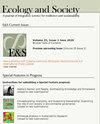推动可持续发展目标的集体领导的六个维度:重新思考作为学术领袖的意义
IF 3.2
2区 社会学
Q1 ECOLOGY
引用次数: 7
摘要
解决我们最紧迫的环境问题需要发展和应用传统学术课程通常不培养的领导技能:推动新的跨学科方法来共同生产可以动员起来的知识的技能。我们概述了一个新的集体领导模式,包括六个维度:询问、联系、参与、战略、授权和反思,并通过一系列案例研究展示了如何利用这些领导力维度为人们及其环境创造积极而持久的变化。我们还描述了学术研究人员如何在自己的工作中学习应用这些维度,并介绍了一系列配套的在线叙述和教学资源,旨在促进在课堂上使用这种集体领导模型。本文章由计算机程序翻译,如有差异,请以英文原文为准。
The six dimensions of collective leadership that advance sustainability objectives: rethinking what it means to be an academic leader
Solutions to our most pressing environmental problems demand the development and application of leadership skills that are not typically fostered in traditional academic programs: skills that advance new transdisciplinary approaches to co-produce knowledge that can be mobilized for action. We outline a new collective leadership model with six dimensions, Inquire, Connect, Engage, Strategize, Empower, and Reflect, and show through a series of case studies how each of these leadership dimensions can be used to create positive and lasting change for people and their environments. We also describe how academic researchers can learn to apply these dimensions in their own work and introduce a series of companion online narratives and teaching resources designed to facilitate the use of this collective leadership model in classrooms.
求助全文
通过发布文献求助,成功后即可免费获取论文全文。
去求助
来源期刊

Ecology and Society
环境科学-生态学
CiteScore
6.20
自引率
4.90%
发文量
109
审稿时长
3 months
期刊介绍:
Ecology and Society is an electronic, peer-reviewed, multi-disciplinary journal devoted to the rapid dissemination of current research. Manuscript submission, peer review, and publication are all handled on the Internet. Software developed for the journal automates all clerical steps during peer review, facilitates a double-blind peer review process, and allows authors and editors to follow the progress of peer review on the Internet. As articles are accepted, they are published in an "Issue in Progress." At four month intervals the Issue-in-Progress is declared a New Issue, and subscribers receive the Table of Contents of the issue via email. Our turn-around time (submission to publication) averages around 350 days.
We encourage publication of special features. Special features are comprised of a set of manuscripts that address a single theme, and include an introductory and summary manuscript. The individual contributions are published in regular issues, and the special feature manuscripts are linked through a table of contents and announced on the journal''s main page.
The journal seeks papers that are novel, integrative and written in a way that is accessible to a wide audience that includes an array of disciplines from the natural sciences, social sciences, and the humanities concerned with the relationship between society and the life-supporting ecosystems on which human wellbeing ultimately depends.
 求助内容:
求助内容: 应助结果提醒方式:
应助结果提醒方式:


